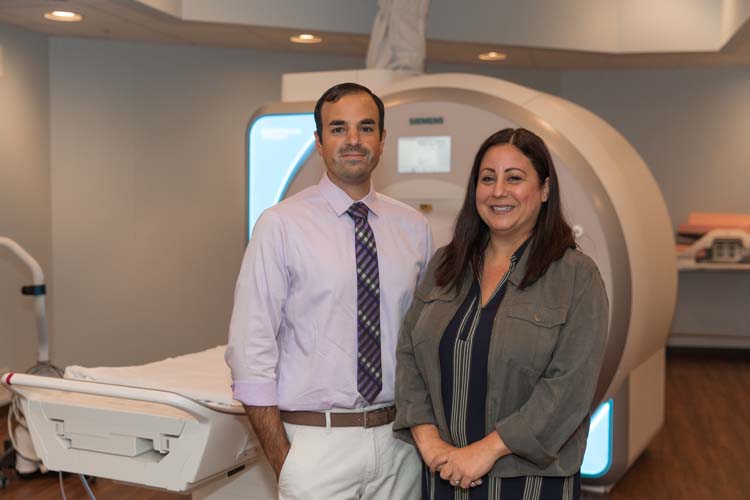
Anyone who has ever had magnetic resonance imaging (an MRI) knows one thing for certain: Those oversized doughnut-shaped devices are really, really loud.
How loud?
Case Western Reserve University declares the noise they make is roughly the equivalent to sound of a jackhammer pounding concrete 10 or 15 feet away.
Now, however, the Sebastian River Medical Center is offering an alternative: a “quiet” MRI.
MRI technologist Jennifer Baumgardner and Matt McGill, senior director of operations for this Steward Healthcare Group facility, are eager to get that word out.
Not familiar with MRIs? Then maybe a little background information might be in order.
First of all, MRIs are not a type of X-ray.
The National Institute of Biomedical Imaging and Bioengineering explains: “MRIs are a non-invasive imaging technology that produce three dimensional detailed anatomical images without the use of damaging radiation. They are often used for disease detection, diagnosis and treatment monitoring. They are based on sophisticated technology that excites and detects the change in the direction of the rotational axis of protons found in the water that makes up living tissues [by] employing powerful magnets which produce a strong magnetic field that forces protons in the body to align with that field.”
Or put a bit more simply, Ohio’s Wooster Hospital says “MRI scans use powerful magnetic fields and radio frequency pulses to produce detailed pictures of organs, soft tissues, bone and other internal body structures. Differences between normal and abnormal tissue is often clearer on an MRI image than a CT scan,” without any potentially harmful exposure to radiation.
MRIs, however, are not for everyone. The FDA warns that people who have implanted medical devices – such as stents, knee or hip replacements, pacemakers, or drug pumps – may not be good candidates and people with tattoos or drug patches can risk skin irritation or even burns. The medical team at Sebastian will assesses patient risk before any scan is attempted.
Meanwhile, Baumgardner quickly quashes one potential misunderstanding in advance by saying SRMC’s quiet MRI is not a completely silent MRI; but she says it is a huge improvement over the jackhammer models.
“Our quiet scan,” Baumgardner explains, “brings [the noise level] all the way down to 64 [decibels] where it was 90 [decibels].” That’s nearly one-third less noise, which is important because patients are “in there for 15, 20 or 30 minutes.”
The National Institutes of Health agrees: “Objective and subjective assessment of acoustic noise levels confirm [quiet MRI software] does significantly reduce sound levels.”
At the heart of the Sebastian hospital’s MRI program is their Siemens Magnetom Aeta 1.5 Tesla open bore MRI platform: a large space age-looking device with a circular hole in the middle. And while there are at least a half dozen manufacturers of MRIs including General Electric, Toshiba and Phillips, Baumgardner says, “Siemens allowed us the most room to grow and expand our services. It’s kind of cutting edge.”
McGill adds, “We like the Siemens brand. We’ve had it before this particular scanner for 17 years. It’s reliable [and they offer] good service.” Siemens itself calls SRMC’s Magnetom Aeta “the top-of-the-line 1.5T scanner.”
Perhaps best of all, its software is upgradable, which is precisely what allows the hospital to now offer quiet MRIs.
The scanner itself is two years old but the software that now allows quieter scans was only installed a few short weeks ago and, according to Baumgardner, that update is already paying dividends. “It helps,” she says, “keep [patients] happier.”
That’s a big plus given the wide age range of those who are scanned and can sometimes become disoriented during a regular MRI.
NIH says “evidence from the scientific literature suggests that neonates may have an increased response to acoustic noise,” and continues by saying that anyone – from pediatric to geriatric patients – “may also become confused due to high MRI acoustic noise.”
That’s the last thing McGill and Baumgardner want for people having an MRI at the Sebastian River Medical Center.
Quieter, they believe, is clearly better.
To schedule an appointment, call the Sebastian River Medical Center’s diagnostic center at 772-589-5000 or ask your doctor to make an appointment for you.



